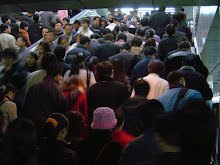Zhongdian County was renamed Shangri-La in 2001 to attract tourists. It’s still known as Zhongdian to most locals but everyone recognizes the new name because of the infamous book it was named after.
“Shangri-La is a fictional place described in the 1933 novel Lost Horizon by British author James Hilton. In the book, "Shangri-La" is a mystical, harmonious valley, gently guided from a lamasery, enclosed in the western end of the Kunlun Mountains. Shangri-La has become synonymous with any earthly paradise but particularly a mythical Himalayan utopia — a permanently happy land, isolated from the outside world.”
Situated over 4500 meters above sea-level on the old Tibetan border in China, Zhongdian is, in every sense of the word, breathtaking. The town still held much of its old character but the best views were outside of town where I found myself in the middle of majestic mountains and ancient Tibetan monasteries.
On day one I was lucky to meet up with a couple I had met in Dali and they quickly told me that I should absolutely see a monastery that was 3 hours outside of town. This proved to be the highlight of my trip to Shangri-la and I could even say that the trip itself was the best part. Rolling evergreen mountains covered in clouds cleared way for gold tan hills and crisp blue skies as we neared the monastery and I was struck at how much the landscapes changed drastically within a few miles. From lush to dry, from green to gold, from humid to dry as a desert.
Once we arrived, my group and I wandered around the village of the monastery. Everything from upkeep to food was the responsibility of the villagers. Everyone lived around the monastery and made their life about it. It was incredibly humbling and was the kind of experience that makes you wonder why and if you even need all of your material possessions. Things like Community, Faith, and Spirit are true possessions that can’t be attained through monetary means, but hard work, purpose, and strength of mind. These people living in the monastery were probably far richer than I will ever be in richness of heart, mind, and soul. I know that I’ve learned to live much simpler now, and realize that sometimes a want is merely a need for something deeper. Maybe this feeling will stay with me. Maybe it won’t.
My remaining time in Zhongdian was spent exploring the old town around my hostel. Small temples and places of worship littered the streets and although most of the Tibetan-style buildings had been converted to little shops catering to foreigners, people’s smiles were still authentic and the food was still cheap. I still hadn’t gotten accustomed to the higher altitude there so most of my exploration would be intercepted with small breaks to give my legs and lungs a break (less oxygen in the air = more cramped legs) but this just added to my experience.
Within a few days I had seen most of what Zhongdian had to offer and the cold weather and rain shooed me out and I was off to Lijiang.
 At the Tibetan monastery
At the Tibetan monastery










